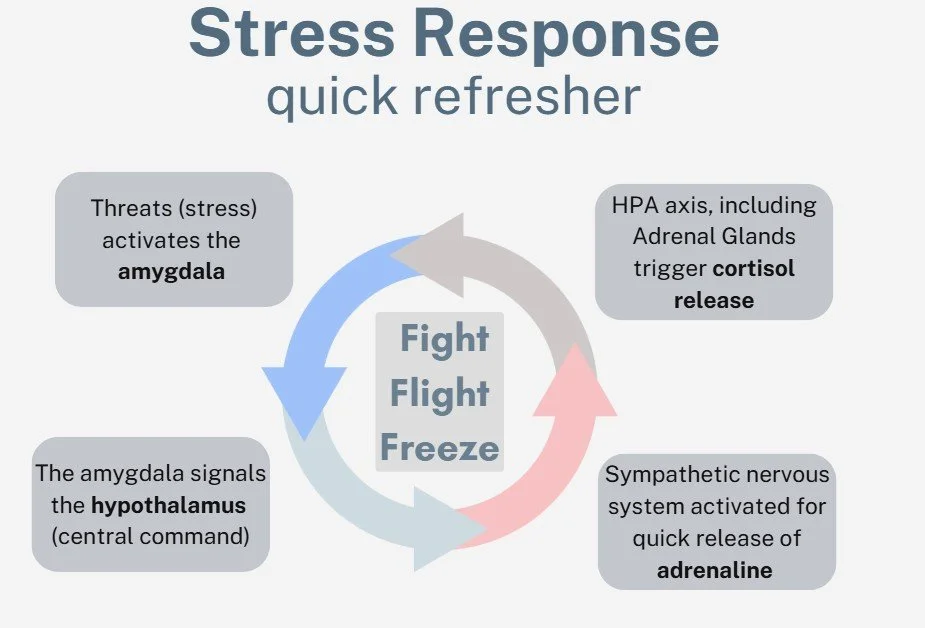The Science behind the Swirl
The Impact of Chronic Stress on our Physical & Mental Health, plus and How to Unplug When It Feels Like You Can’t Slow Down
“Why am I always so tired?” - sound familiar?
In our fast-paced world, it's common to feel overwhelmed by constant demands at work, with family, and technology. If you find yourself asking, "Why am I so stressed?" or searching for ways to unplug when slowing down seems impossible, you're not alone. At unBurnt, we believe that understanding the science behind stress can empower you to take small, effective steps toward relief.
The Modern-Day Stress Cycle
Stress is the body's natural response to perceived threats, activating the "fight or flight" system. Some stress is important, and necessary to keep us alive. A little stress nd short-term stress is perfectly fine. Bu when we're stuck in chronic stress, we are stuck in the physiological response that comes along with it. In today's environment, chronic stressors, such as tight deadlines, financial pressures, and constant connectivity keep this system perpetually engaged, leading to physical and emotional exhaustion.
Physical Symptoms of Chronic Stress
Chronic stress can manifest in various physical symptoms, and while everyone's experience is different it’s important to check with your healthcare provider because these could also be symptoms from other underlying issues. Some of the ways that chronic-stress may impact us and show up include:
Headaches and Muscle Tension: Persistent stress can cause tension headaches and muscle pain, particularly in the neck and shoulders.
Heart Disease: Risks of work-related burnout include heart disease, high cholesterol, or high blood pressure, according to the American Heart Association.
Digestive Issues: Stress affects the gastrointestinal system, leading to stomachaches, nausea, or changes in appetite.
Sleep Disturbances: Difficulty falling or staying asleep is common, which can exacerbate fatigue and irritability.
Weakened Immune System: Prolonged stress can suppress immune function, making you more susceptible to illnesses.
Mental and Behavioral Symptoms
Beyond physical effects, chronic stress has the potential to impact mental health and behavior:
Anxiety and Depression: Ongoing stress can contribute to feelings of anxiety, sadness, and hopelessness.
Cognitive Impairments: You may experience difficulty concentrating, memory problems, or decision fatigue.
Behavioral Changes: Stress can lead to unhealthy coping mechanisms, such as overeating, substance use, or social withdrawal.
Moodiness and less empathetic: The smallest inconvenience can feel overwhelming and your emotional bandwidth shrinks. This happens because chronic stress overloads the nervous system and diminishes your capacity for emotional regulation.
Emotional Numbness or Detachment: You may stop feeling much at all, joy or sadness. This emotional flatlining is your brain’s way of trying to protect itself.
Impact on Collaboration, Innovation, and Relationships
Chronic stress doesn't just affect individuals—it can hinder teamwork and creativity:
Reduced Collaboration: Stress can impair communication and trust among team members, leading to decreased collaboration.
Stifled Innovation: High stress levels limit creative thinking and problem-solving abilities.
Strained Relationships: Irritability and emotional exhaustion can negatively impact personal and professional relationships.
Micro-Moments to De-Stress: unBurnt Framework rooted in Science
At unBurnt, we advocate for integrating micro-habits into your daily routine to combat stress effectively. We are tired, and decrease our activity levels which we NEED to keep our systems functioning and complete the stress cycle. It's a vicious cycle because we need rest, and yet we can't if we're stuck, we can't turn off and settle.
Our framework includes three categories.
1. Pause:
Create space for rest and incorporate brief breaks throughout your day. Your to list will quite literally never be done so it’s important to consistently schedule beaks and honor these commitments like you would any other meeting or obligation.
Screen-Free Moments: Step away from your computer and phone at least 1-2 times a day to take a sensory break.
Deep Breathing: Practice controlled breathing exercises to activate the parasympathetic nervous system, promoting relaxation.
Benefits: Reduces decision fatigue and impact of context switching and increases focus & flexibility. Downregulates sympathetic nervous system, regulates heart rate and decreases cortisol levels.
2. Diagnose
Regularly take time to assess your stress and create a ritual to wrap up every day. This gives you a necessary breather, transitioning from your workday to your evening and also gives you the opportunity to look at what was accomplished, what still needs to get done and what may need to be reprioritized.
Stressor Scan: Identify and document stressors to gain clarity and control.
Daily Self Check-Ins: Take a moment to wrap up your day observe your thoughts and feelings without judgment.
Benefits: Naming your stres reduces the intensity of the stress response and increases emotional regulation. When you both name and understand why you’re worried, you reframe the perceived threat as something more manageable. This slows stress response, reduces anticipatory stress and uncertainty, by calming the hypothalamic-pituitary-adrenal (HPA) axis. Additionally, when you create a daily or weekly wrap up ritual, you are operating in executive functioning and give to yourself agency to take over.
3. Reflect
End your day with gratitude and your work week with reflection.
Gratitude Practice: Note positive experiences to shift focus from stressors.
Weekly Wrap-Up: Review accomplishments and set intentions for the next day to foster a sense of closure and preparedness.
Benefits: By reflecting, you’re strengthening memory consolidation and learning. When you do this, you’re activating your hippocampus and help to encode and retain positive experiences.
Remember, even small steps can lead to significant changes. At unBurnt, we're here to support you on your journey to a more balanced life. By understanding the impact of chronic stress and implementing these micro-habits, you can begin to carve out precious time back and simple ways to gently reset your nervous system and reclaim your mood. For more resources, check out the Wellness Hub.
Note: This blog post is for informational purposes only and does not constitute medical advice. If you're experiencing symptoms of burnout chronic fatigue or otherwise feel unwell, please consult a healthcare professional.

